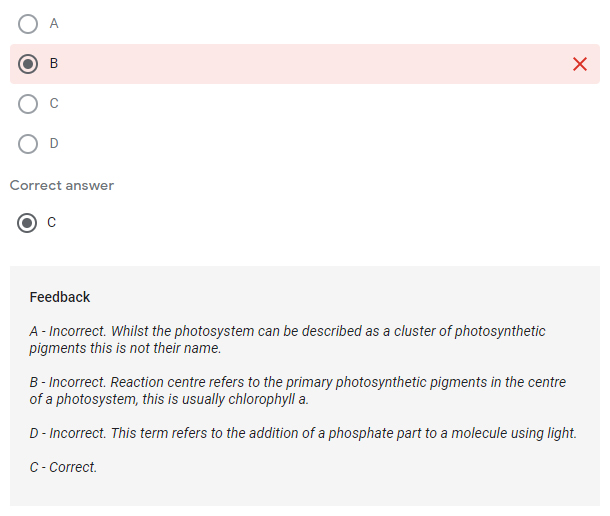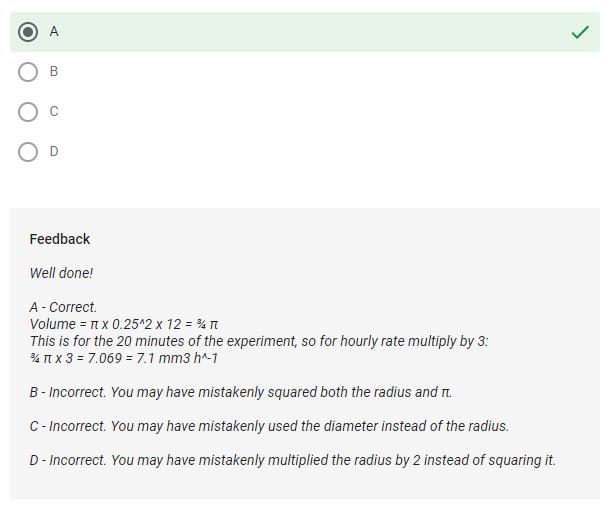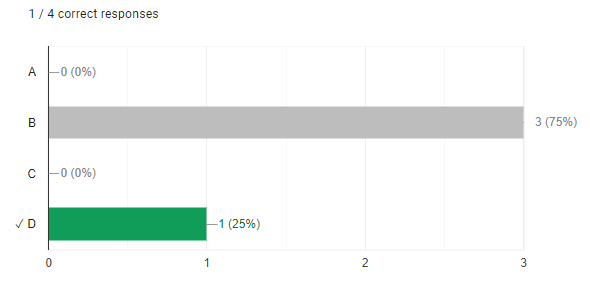What’s new? A Level Biology resources autumn 2020
23 October 2020
Commentary - 4 minute read
Sylvia Grice, OCR Science Subject Advisor

In early summer 2020 I wrote Our A Level Biology resources – the best bits that proved incredibly popular. Fast forward a few months and we have so many new resources and to share them with you a second blog beckons!
Online multiple choice question quizzes
A selection of our MCQ quizzes have now been published as digital versions. We have instructions for how to use these quizzes and they are currently available for the topics communication and homeostasis, enzymes and photosynthesis. These are auto marked and give feedback to students based on their responses so are brilliant for formative assessment.
I have included some visual examples of what you’ll find in the quiz below.


They also allow teachers to collect data on their classes' performance so they can target review and intervention as appropriate.

Practical skills support
Under the Changes for 2021 tab on our qualification planning and teaching webpages, there is a new practical activities support guide. This showcases possible adaptations which you can make to our PAG activities to suit your centre and sign posts you to other support resources for delivering Module 1 – Development of practical skills in biology.
The guide begins with an introduction to our practical endorsement and tables mapping our PAG activities to the Common Practical Assessment Criteria (CPAC) and our A Level Biology specification’s 1.2.1 Practical skills and 1.2.2 Use of apparatus and techniques learning outcomes.
The guide is then divided up into three sections for each PAG:
- Overview – this briefly outlines our suggested PAG activities and the skills that could be assessed through them.
- Possible adjustments – this gives suggestions on how our PAG activities may be adapted to suit different centres and students, for example if a fume cupboard isn’t accessible or if time is short.
- Support resources – this sign posts you to online resources which can support teachers as they plan and/ or adjust practical activities and students as they revise the specification’s learning outcomes in 1.1 Practical skills assessed in a written examination.
New topic tests and practice exam question sets
We have made new topic tests for Biology A Modules 5 and 6 and Biology B Modules 4 and 5 so we now have full sets of end of module tests for both specifications.
For Module 1 – Development of practical skills in Biology we have developed PAG practice question sets. This is a zip folder of 11 sets of practice exam questions and mark schemes divided up into our PAG activities. These are not designed to be used as topic tests but are intended to support teaching and learning of Module 1.
Resources for students
These resources are specifically designed to be used directly by students. The first, Exam hints (available for Biology A and Biology B) pulls together the summer highlights and examiner comment summary from 2017-2019 exams and arranges them by the specification learning outcomes.
The second is a Microsoft Word editable student revision checklist (available for Biology A) detailing the specification learning outcomes. This gives space for students to RAG rate their own understanding and add their own comments, perhaps highlighting particular sections they are confused on to aid conversations with their teachers.

Have you used any of our resources so far? What have you found useful? What would you love to see coming up next? Let us know in the comments below or by contacting us!
Stay connected
If you have any queries or questions, you can email us at science@ocr.org.uk, call us on 01223 553998 or Tweet us @OCR_Science. You can also sign up to subject updates and receive information about resources and support.
About the author
Sylvia Grice – Subject Advisor – Biology
Sylvia joined OCR in April 2020 with specific responsibility for A Level Biology. She has come straight from the classroom after 8 years teaching GCSE Science and A Level Biology in Wiltshire and Norfolk with a brief period teaching in America. She is passionate about providing the support needed for excellent teaching and learning. Sylvia holds a degree in Natural Sciences and a PGCE in Secondary Science from the University of Bath. In her spare time Sylvia enjoys travelling around the UK in her campervan with her family.
By the same author